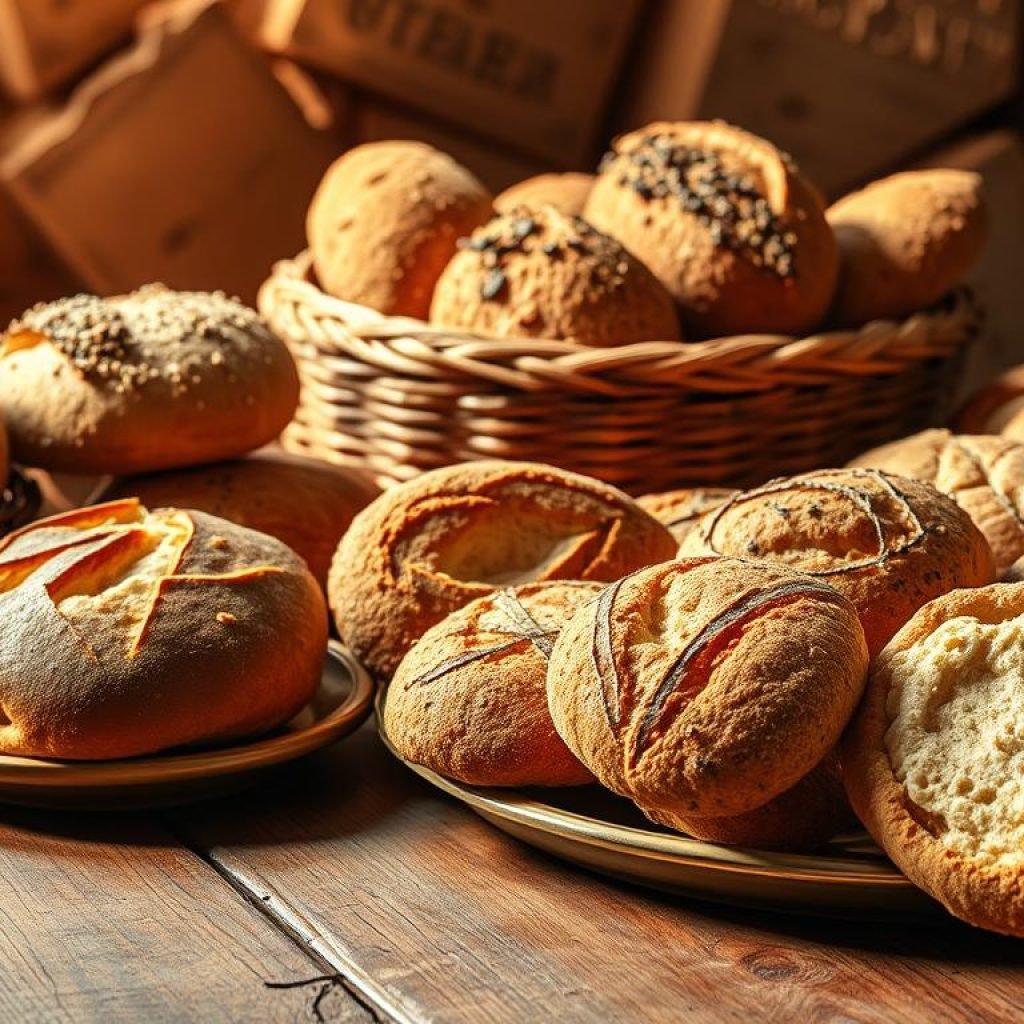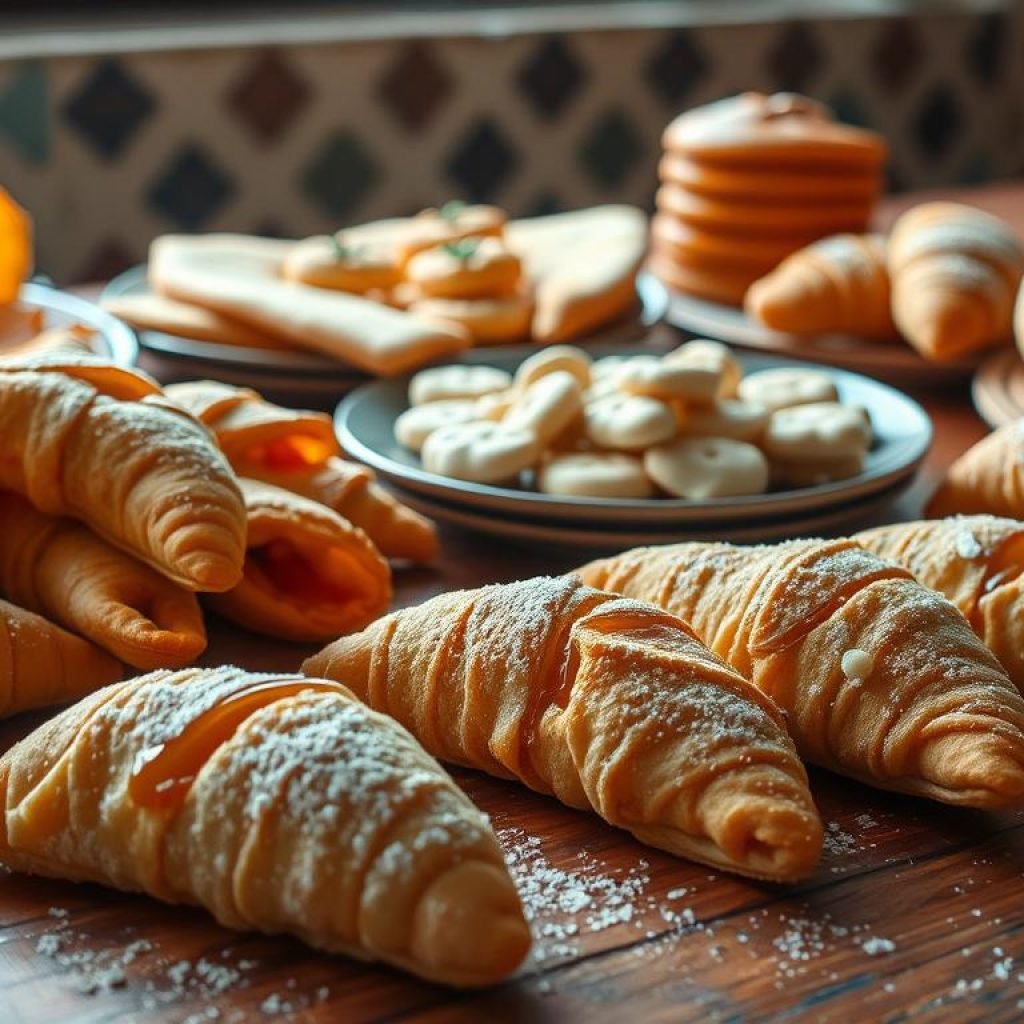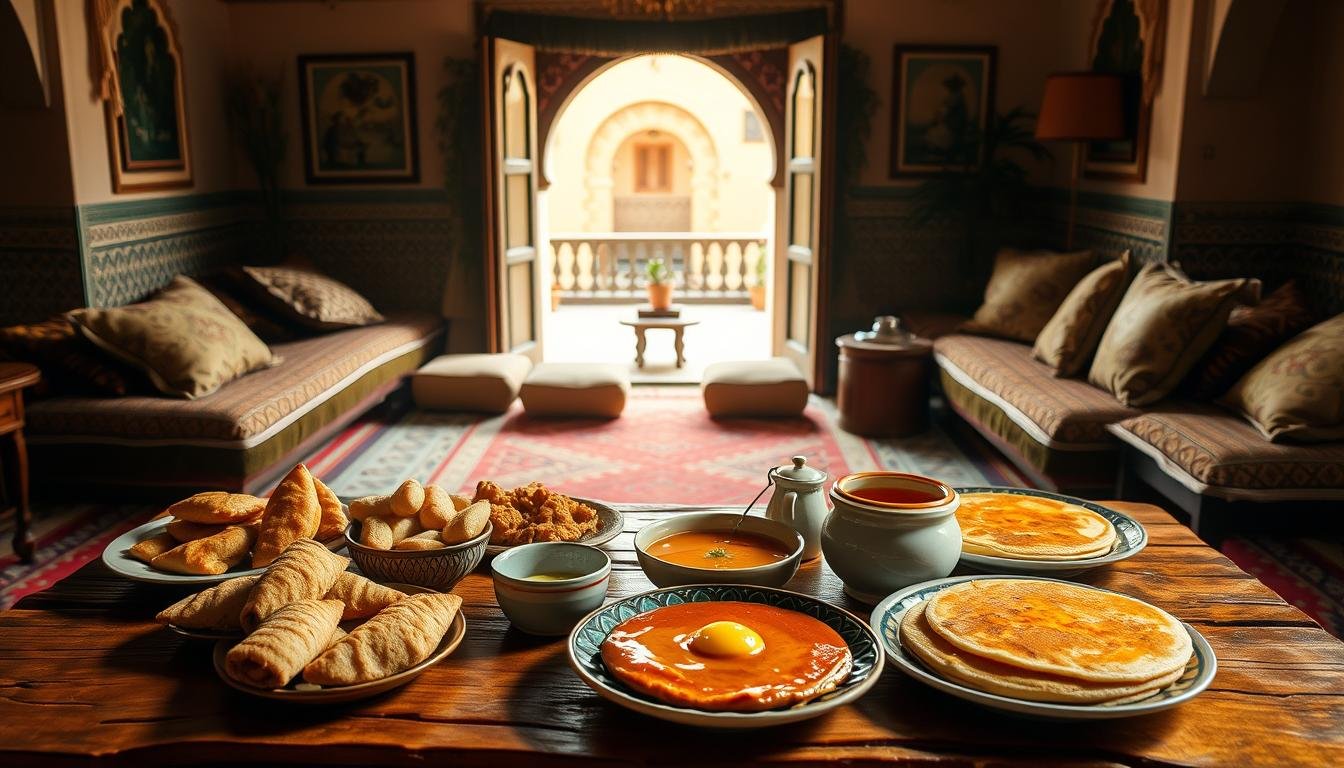Imagine starting your day with a delicious Moroccan breakfast. It’s filled with flavors and aromas that take you to Marrakech’s vibrant streets. Exploring local markets and cuisine, you might wonder what makes Moroccan breakfast so special. Morocco food tours let you experience authentic Moroccan cuisine and uncover its secrets.
Moroccan breakfast is a culinary journey with sweet pastries and savory tagines. It leaves you wanting more. With many options like cooking classes and street food tours, you can dive into the local cuisine. Morocco offers something for everyone, making your Moroccan cuisine experiences unforgettable.
Exploring Moroccan breakfast, you’ll find a variety of salads, appetizers, and sweets. Each dish has its own cultural significance and traditional preparation. Morocco food tours let you explore local markets, learn cooking techniques, and enjoy the best dishes. Your Moroccan cuisine experiences will be truly unforgettable.
Key Takeaways
- Moroccan breakfast is a unique and delicious culinary experience
- With Morocco food tours, you can explore the local markets and cuisine
- Traditional Moroccan breakfast dishes include a variety of bread, pancakes, and pastries
- Moroccan cuisine experiences offer a wide range of options, from cooking classes to street food tours
- Visitors can indulge in the local cuisine and learn about the culture behind it
- Moroccan cuisine features a wide range of salads, appetizers, and sweets
An Introduction to Moroccan Breakfast Culture
Moroccan breakfast culture is both unique and fascinating. It combines flavors and ingredients like traditional bread, pastries, and soups. Visitors can taste the real Morocco through Culinary tours Morocco. A typical Moroccan breakfast has bread, honey, olive oil, jam, olives, cheese, eggs, and mint tea.
Trying local dishes is the best way to experience Authentic Moroccan food experiences. In Morocco, breakfast is a big deal. You’ll find everything from sweet pastries to savory soups. You can try traditional bread like msemmen or harcha, or local cheeses and olives.
If you want to dive into Moroccan cuisine, Culinary tours Morocco are perfect. They focus on Authentic Moroccan food experiences. You’ll learn about cooking and culture through classes and market visits.
Traditional Moroccan Bread Varieties
Moroccan bread is a key part of the country’s food scene. It shows the rich culinary history. When you explore Moroccan food, trying the traditional breads is a must. Visit local bakeries for the freshest bread on the best food tours in Morocco.
Popular breads include khobz, msemmen, and beghrir. Khobz is a round, semi-flat loaf made from various flours. Msemmen is like a pancake, great for brunch or snacks. Beghrir, or the Moroccan crepe, is light and airy, perfect for special events.
These breads are not just tasty; they’re also key to Moroccan culture. They’re used to scoop up food and are often torn to dip into sauces. Trying traditional Moroccan bread is a must for anyone exploring Moroccan food or looking for something new.

Moroccan bread offers a unique taste and texture experience. So, why not start a journey to find the best food tours in Morocco? Dive into the world of traditional Moroccan bread.
Classic Moroccan Breakfast Dishes to Savor
Joining Taste of Morocco tours is a great way to taste Morocco’s real flavors. Moroccan breakfasts show the country’s rich food culture. They offer many dishes for every taste. For a unique taste of Morocco, try Exotic food tours Morocco.
In Morocco, breakfast is special. It’s filled with traditional dishes that are both tasty and healthy. Bissara, a fava bean soup, is a favorite. It’s made with cumin, garlic, and paprika, showing Moroccan cooking’s skill. Lben, a fermented milk, is refreshing and perfect for mornings.
These dishes are not just yummy. They also give a peek into Morocco’s culture. By going on Taste of Morocco tours or Exotic food tours Morocco, you can taste Morocco’s true flavors. You’ll also learn about cooking methods passed down through generations.
Sweet Delights: Moroccan Breakfast Pastries
Moroccan pastries are a sweet and delicious part of the country’s food culture. You can find many options, like sfenj and baklava. These treats are a must-try for anyone wanting to experience the best of Gourmet food experiences in Morocco. They are perfect for trying something new or learning about traditional pastry-making.
Some popular Moroccan pastries include:
- Sfenj: a type of doughnut that is often coated in sugar or honey
- Baklava: a sweet pastry made with layers of phyllo dough and filled with nuts and honey
These pastries are a big part of a traditional Moroccan breakfast. They are a great way to dive into the country’s rich culinary culture. For those interested in Morocco food tours, don’t miss the local bakeries and pastry shops. There, you can try a variety of delicious treats.

Moroccan pastries are not just tasty; they also hold a lot of cultural significance. Many are made with traditional ingredients and techniques passed down through generations. They are often served at special occasions and celebrations. Whether you’re looking to explore Moroccan cuisine or just want to try something new, be sure to check out these sweet delights.
The Role of Tea in Moroccan Breakfast
Moroccan cuisine is not complete without traditional mint tea. It’s a key part of Moroccan breakfast culture. On Culinary tours Morocco, visitors can taste the unique flavors and learn about this beloved drink.
Tea is a big part of Moroccan hospitality. Its preparation is seen as an art. The traditional tea ceremony lasts 30 minutes to 1 hour. It involves gunpowder green tea, fresh mint, and sugar to make a refreshing drink.
A typical Moroccan mint tea recipe makes 4-6 small cups. The amount of sugar used is between 1 to 3 sugar cubes. To make it, use 1 tablespoon of loose gunpowder green tea for every 3 1/2 cups of water. About 10 sprigs of fresh mint are added for flavor.
Some important parts of Moroccan tea culture include sugar cones and “washing” the tea leaves. The pouring technique is key to create a bubbly foam. Visitors can enjoy pastries and snacks with their tea, like Ghoriba and Almond briouat.
Whether you’re exploring Culinary tours Morocco or just interested in Moroccan breakfast traditions, tea is a must-try.
Seasonal Variations in Moroccan Breakfast
Moroccan breakfasts are full of flavor and change with the seasons. As the seasons change, so do the ingredients and dishes. For an authentic Moroccan food experience, trying local specialties is key. These dishes often use fresh, seasonal ingredients.
In spring, Moroccans enjoy fresh fruits, nuts, and spices in their breakfasts. Summer brings lighter dishes like yogurt and cucumber salads. Joining a best food tour in Morocco is a great way to explore these flavors.
Some popular seasonal ingredients include:
- Fresh citrus fruits, such as oranges and lemons
- Nuts, like almonds and walnuts
- Spices, including cinnamon and ginger
Moroccan breakfasts also have special dishes for holidays. For example, during Ramadan, they enjoy harira. This is a hearty soup with lentils, chickpeas, and tomatoes. Trying these seasonal dishes and special ones will deepen your understanding of Moroccan cuisine. You’ll enjoy an authentic Moroccan food experience.
Regional Influences on Moroccan Breakfast
When you explore Moroccan food culture, you’ll find that breakfast varies by region. Coastal towns and inland cities each have their own flavors and ingredients. Joining Taste of Morocco tours is a great way to see these differences.
In Morocco, breakfast shows off the region’s history and culture. Coastal areas are known for fresh seafood and citrus. Inland, you’ll find rich produce like olives, almonds, and dates.
- Argan oil from the souss-massa region, used in cooking and cosmetics
- Orange blossom water from the fez region, used in baking and desserts
- Spices like cumin, coriander, and cinnamon from the Marrakech region, used in tagines and stews
Exploring Moroccan breakfast reveals the country’s rich culinary heritage. It shows the value of keeping traditional cooking alive. Whether you love food or just want to learn about new cultures, Explore Moroccan food culture with Taste of Morocco tours.
Fusion of Cultures: Moroccan Breakfast Today
Moroccan breakfast is a mix of cultures, with new takes on old dishes and global flavors. This mix of tastes and ingredients has made breakfast in Morocco exciting. Exotic food tours Morocco let you taste the real flavors of the country.
From msemen and bissara to new dishes, Moroccan breakfast is a journey. With Gourmet food experiences in Morocco, you can try different flavors. You’ll find everything from sweet pastries to savory tagines.
Modern Twists on Traditional Dishes
Chefs in Morocco are trying new things, mixing old flavors with new twists. This has made breakfast exciting, with dishes for everyone.
Influence of Global Cuisine
Global cuisine has added to Morocco’s breakfast dishes, from French pastries to Middle Eastern mezze. This variety makes breakfast in Morocco lively. Exotic food tours Morocco and Gourmet food experiences in Morocco show you the best of Moroccan breakfast.
Health Benefits of Common Moroccan Ingredients
Moroccan cuisine is famous for its rich flavors and smells. This is thanks to the many spices and ingredients used. For those interested in Morocco food tours or wanting to try Moroccan cuisine experiences, knowing the health benefits of these ingredients is key.
Traditional Moroccan spices and ingredients offer many health perks. Cumin helps with digestion and has anti-inflammatory effects. Cinnamon can lower blood sugar and improve insulin use, which is good for diabetes.
Ginger, turmeric, and saffron are also common in Moroccan cooking. They are full of antioxidants and have anti-inflammatory properties. These can help fight chronic diseases. The slow-cooking method in dishes like tagines also keeps nutrients in and makes food easier to digest.
If you want to add Moroccan cuisine’s health benefits to your diet, start with whole grains and spices in breakfast. Whether through Morocco food tours or personal Moroccan cuisine experiences, exploring Moroccan food can be tasty and healthy.
Tips for Creating a Moroccan Breakfast at Home
Dive into the world of Moroccan cuisine with Culinary tours Morocco at home. Start your day with a Moroccan breakfast by stocking up on key ingredients and learning simple recipes. A traditional Moroccan breakfast includes bread, tea, and olive oil, making it a light yet satisfying start.
For an Authentic Moroccan food experience, you’ll need wheat, olive oil, and spices. These basics help you make everything from hearty soups to sweet pastries. With these ingredients, you can start exploring Moroccan breakfast cuisine.
Try making msemmen, beghrir, and b’ssara, a thick fava bean soup. Pair these dishes with Moroccan mint tea for a complete breakfast. This will bring the Culinary tours Morocco experience right to your table.
Begin with hrbil, a traditional Moroccan breakfast. It’s made with wheat, olive oil, and milk. This recipe takes about 12 hours to prepare and 45 minutes to an hour to cook. It’s perfect for a relaxing weekend morning. By following these tips and trying new recipes, you can enjoy a delicious Authentic Moroccan food experience at home.
Conclusion: Enjoying Moroccan Breakfast Traditions
As we wrap up our look at Moroccan breakfast, we invite you to start your own food adventure. From the lively food tours in Morocco to cozy home meals, exploring Moroccan food culture is amazing.
Moroccan breakfast is more than a meal; it shows the country’s rich culture. It mixes Berber, Arab, and Mediterranean tastes. The spices, breads, and ingredients blend into a flavorful mix that delights everyone.
Try a Moroccan mint tea, a flaky msemmen, or a hearty bissara. Each bite takes you to Marrakech’s busy streets or the quiet countryside. Enjoy the real taste of Moroccan breakfast and find a meal that feeds both your body and soul.




Comment (0)